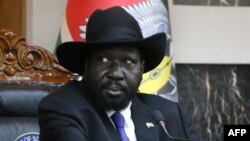On South Sudan's ninth independence anniversary, President Salva Kiir acknowledged that months of deadly intercommunal fighting threatens to rip the country apart. In a wide-ranging televised speech to the nation, the president Thursday called on all South Sudanese to work for peace and reconcile communities whose social fabric has been “torn apart by war.”
“The phase of political violence is now behind us. Unfortunately, our success in ending political violence is now threatened by different sorts of violence. Intercommunal conflict is raging in different parts of our country. As a government we will not allow this to reverse our gains,” said Kiir.
U.N. Mission in South Sudan chief David Shearer told VOA that several hundred people died last month in a wave of attacks and counterattacks in Jonglei state.
"A multilayered approach"
The government will undertake what Kiir called “a multilayered approach” that includes intercommunal dialogue, strengthening the rule of law and order, and taking away civilians’ guns.
“For those who will not heed this call, the government will be left with no option than to forcefully remove these weapons from their hands. The government hopes this will not be the case,” Kiir said in his speech.
On the fragile, revitalized peace agreement, Kiir said he is aware of the slow progress that’s being made and urged partners in the unity transitional government to work together to resolve remaining issues.
“It is critical that we, the parties to the agreement, desist from adopting uncompromising positions in the hope that mediation will eventually back them. We must move away from such attitudes because the peace we seek to consolidate is our own peace as South Sudanese,” said Kiir.
The transitional government was formed in February, but it took the former warring parties until June to nominate the states’ governors. Two of the 10 governors have yet to be appointed.
The president called on all South Sudanese to “work tirelessly irrespective of our political leaning to restore trust among ourselves,” and to “desist from propaganda.” He asked citizens everywhere to work toward putting the country “permanently on the path of peace.”
Economy hurt by pandemic
Kiir touched on the country’s struggling economy, saying the coronavirus pandemic had hurt the nation’s oil sector, which accounts for more than 95% of South Sudan’s revenue.
“The pandemic has depressed oil prices and we have been unable to compensate for the shortfall in oil revenue with non-oil revenue,” Kiir said in his speech.
If government agencies could be more efficient at collecting taxes and other non-oil revenue, the president said, the government then could “meet expenditures and operations. Unfortunately, this has not been the case.”
Government officials are exploring ways to ensure that taxes and fees are paid so the government can pay the salaries of civil servants on time, said Kiir.
Soldiers and civil service employees frequently have pointed out they have not received their salaries in months.







